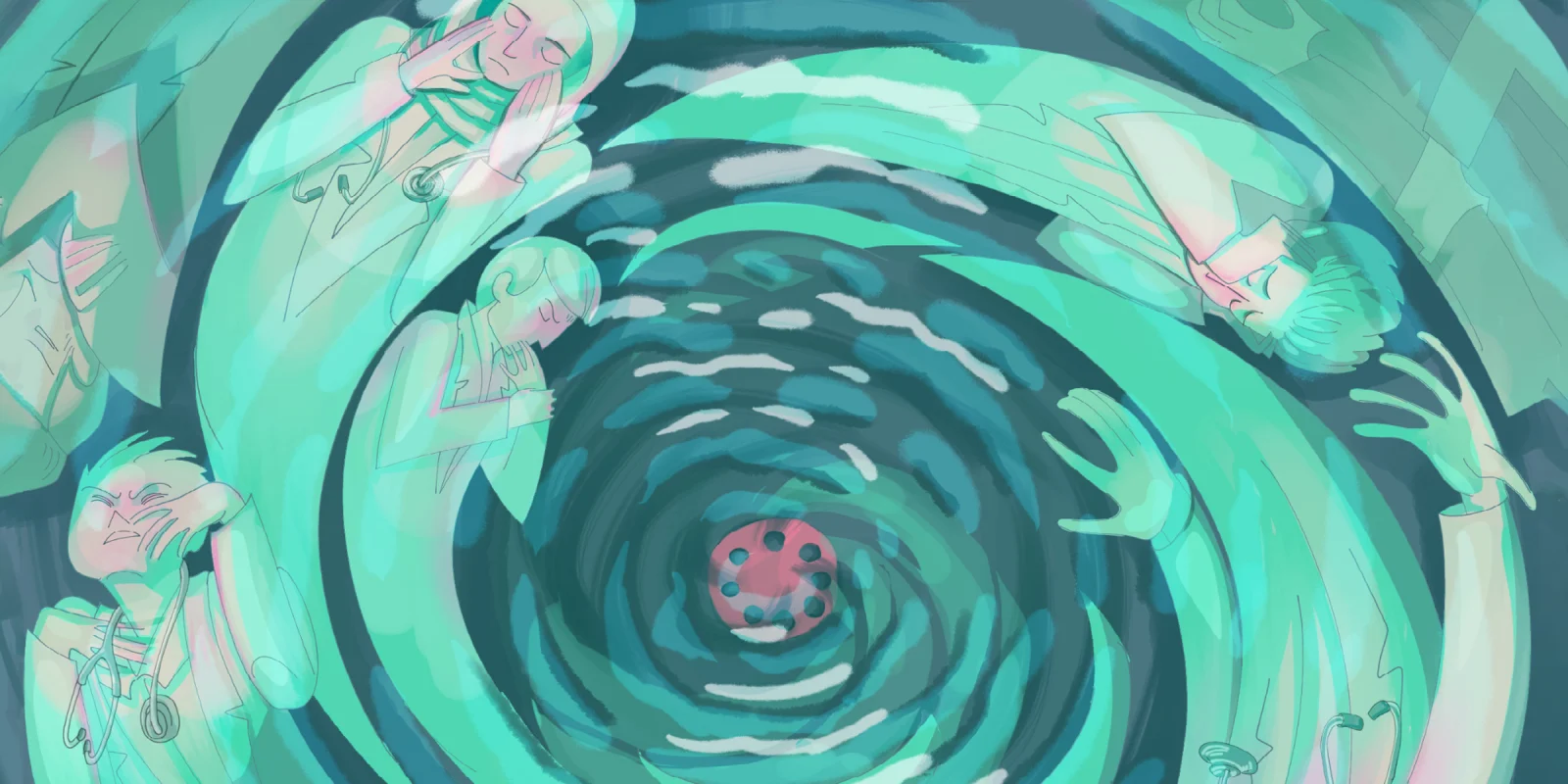Another call day was nigh. I tossed restlessly, waking at 4:30, then 5, then 5:30 a.m. My heart raced with anticipatory dread. By the time I arrived at the hospital at 6 a.m., already exhausted, my first thought was How I can leave as soon as possible?
On rounds, my mind moved sluggishly. I could not remember relevant details. I could usually recall the most minute details, storing them away subconsciously. This felt disconcerting. When my pager harshly rent the air, I became increasingly irritable.
My senior resident interrupted my stupor, alerting me to an admission for a gentleman with difficulty breathing and hemoptysis; he cautioned me to wear an N95 in case it was tuberculosis. Midway through the history-taking, I received a call from a consultant. I asked if I could call him back. I found myself inexplicably transposing the digits of his callback number. My glasses fogged up, my chest tightened, my breath shortened, and I felt lightheaded. I excused myself and looked for a quiet place to sit. My phone rang. Serendipitously, it was a faculty advisor. He was concerned — it had been days since he had replied to my email revealing that I was struggling. Embarrassed, I told him I was feeling acutely unwell. As I shared further details, he urged me to go home, saying he would assist in arranging coverage. I demurred, though I breathed a sigh of relief, fighting back tears.
Residency is still treated as a rite of passage, the interminable hours treated as a badge of honor. Medicine self-selects for perfectionists and high achievers partly because medical school and residency selection criteria still emphasize exam scores, GPA, and lengthy CVs. That emphasis breeds a culture of heroism and concomitant shame when we do not meet our impossible expectations. The relentlessness of the schedule undermines self-care. It is no wonder then that, alarmingly, more than 20% of residents early in their training experience depression, myself included.
Despite working as medical teams, care often feels like parallel play, each resident silently toiling alone. The honeymoon phase of intern year with the novelty of being called “doctor” and being able to sign orders oneself wanes. Carrying a pager begins to feel ponderous. When a patient complained of chest pain, I worried about missing a heart attack. As the year wore on, I found myself worried that I was not maturing as a clinician. Impostor syndrome can be paralyzing. Days before my anxiety attack, my attending asked me the recommended duration for anticoagulation for a first-time, provoked pulmonary embolus. I diffidently responded, “Six months?” He stared at me blankly, seemingly communicating, Didn’t you go to medical school? My stomach sank.
Medical school, though, does not prepare one for the crucible of residency. The disjointed assemblage of facts that one memorizes for USMLE exams is a far cry from the reality of residency. Beyond the steep learning curve associated with clinical reasoning, navigating the labyrinthine process of care can prove maddening. Thanksgiving of my intern year, I found myself trying to arrange home oxygen for a patient. On a holiday, it was a futile effort, and yet, as a check box on my to-do list, I felt that failing to do so would reflect my own inefficacy.
The COVID-19 pandemic cleaved my residency experience into a before and after phase. Each successive wave of COVID-19 stretched my co-residents and me thinner, and preyed on the goodwill of health care workers. Dr. Lorna Breen, an EM physician in New York who died by suicide, heartbreakingly exemplifies not only the still-taboo nature of discussing mental health struggles among physicians, but also the second toll that COVID-19 has taken on the health care workforce. She is not alone; we lost a promising young physician in my residency, too. Worryingly, 58% of physicians now report feeling burnt out. Asking for help can be difficult; while my request for help was answered, my email to my advisor came after two months of progressive melancholy, a time in which I thought my struggles were a fever I could just ignore and sweat out. Accessing mental health services can prove harder. An 80-hour weekly schedule leaves little room to schedule an appointment and the unacceptably poor coverage and reimbursement for mental health services even among the insured create a porous mental health care landscape. I called numerous therapists and ultimately gave up, relying on the catch-as-catch-can availability of the employee assistance program until that, too, proved logistically challenging.
The Dr. Lorna Breen Health Care Provider Protection Act provides funding to identify the causes of health care provider burnout and improve access to treatment. It is a step in the right direction; however, I remain skeptical that an entirely top-down approach alone will transform the culture and structure of health care, de-stigmatize mental illness, and ensure more salubrious work conditions. We, as individuals and health care communities, need to be more proactive. First, as a senior resident, I began each day with a check-in, asking team members for one adjective that described how they were feeling. That then clued me into where my time could be spent to buoy those who might need an extra hand. I have subsequently strived to be open with others in terms of my own travails as a trainee, eschewing the tendency to see mental health struggles as weakness.
Second, GME offices must each gather data on the prevalence of mental health struggles within their programs and undertake quality improvement initiatives to bolster resources. We cannot fix that which we do not understand. We, as residents, need to be clear-eyed and honest in terms of work-hour violations rather than succumb to the implicit pressure to lie on our timesheets. In turn, programs must determine ways to optimize trainees’ ability to operate at the top of their license, caring for sufficient patients to be ready to be independent clinicians but not at the cost of trainees’ well-being or patient safety and without being saddled with the sizable administrative burden associated with care.
Third, mental health resources ought to be embedded within GME offices with on-call and easily accessible drop-in therapists, and institutions need to ensure ready access to affordable, confidential, and longitudinal mental health services outside of their institutions. When we do ask for help, there cannot be repercussions. I was fortunate, but a co-resident/friend was not. If hospitals and programs fail to proactively ensure trainee well-being, I strongly encourage trainees to contemplate unionization.
To do good in this fractious world, one must be in a good place oneself. To those interns beginning their training, I say: Know that when you are struggling, you are not alone. Ask for help knowing that you deserve to be supported.
How else can we support residents? Share your ideas in the comments.
Dr. Anand Habib is a third-year internal medicine resident at University of California, San Francisco. Originally from Houston, Dr. Habib completed his undergraduate work with honors at Stanford, worked as a Global Health Fellow at a clinic in Haiti's central plateau, finished a masters degree with distinction in Medical Anthropology at Oxford University as a Rhodes Scholar, and earned a medical degree from Harvard Medical School. He has previously studied the use of therapies for hematologic malignancies and oncologists' feelings of prognostic uncertainty in advanced lung cancer and is currently pursuing interests at the nexus of ethics, health policy, and distributive justice. He is a 2021–2022 Doximity Op-Med Fellow.
Illustration by April Brust







